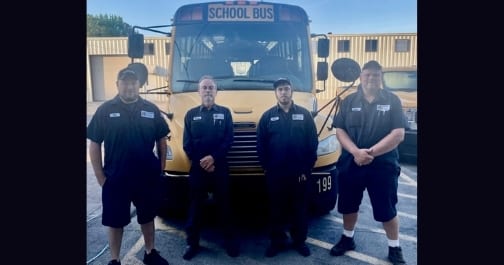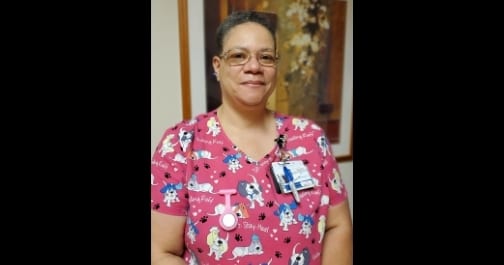WIZS Local News Audio 5-24-21 Noon
Thank you for listening to WIZS Radio, Your Community Voice!
Thank you for listening to WIZS Radio, Your Community Voice!
John C. Rose and Bill Harris discuss Vance County Schools including graduation, Dr. Anthony Jackson’s resignation and the search for a new superintendent.
For complete details and audio click play.
– press release –
Governor Roy Cooper today issued an Executive Order directing the Department of Commerce to encourage and help people who are receiving unemployment benefits transition back into employment.
“Unemployment benefits have provided a critical lifeline for many North Carolinians living on the edge due to the pandemic. As our state emerges from the pandemic, we want to help people safely return to work as soon as possible. Reinstating the work search guidelines will help connect claimants with employers, resources and tools to help them return to the workforce,” said Governor Cooper.
Under Executive Order 216, all existing claimants of unemployment benefits will be required to fulfill work search requirements beginning June 6, 2021. All existing claimants will be required over the next several weeks to register with a jobseeker account on NCWorks.gov.
The Order also directs the N.C. Department of Commerce to explore opportunities, consistent with federal law and through the use of certain federal funds, to establish a reemployment incentive program for jobless workers who find and maintain employment.
Today’s action expands upon Governor Cooper’s Executive Order 200, which reinstated work search requirements for new claimants after March 14, 2021. As North Carolina makes progress on its key COVID-19 metrics, the work search requirements will now apply to everyone currently filing for unemployment benefits.
Under the Order:
Since the start of the pandemic, North Carolina has distributed more than $11.7 billion in unemployment benefits across multiple state and federal programs. Approximately 245,000 North Carolinians are currently receiving benefit payments each week.
For work search assistance in North Carolina, jobseekers can contact NCWorks at NCWorks.gov or 1-855-NCWorks. Information about unemployment benefits can be found at des.nc.gov.
Read the Order.
– Vance County Schools Press Release –
Vance County Schools Superintendent, Dr. Anthony Jackson, has announced his resignation, after six years of service to the district. Jackson describes his time in Vance County Schools as “the most amazing and professionally fulfilling of my entire career.”
During Jackson’s time with VCS, the district has improved student outcomes, consolidated schools, increased the on-time graduation rate, decreased long-term suspensions and dropout rates, along with, developed a new strategic plan, implemented a digital 1:1 program, started the Arts Alive talent showcase, redesigned innovative programs, launched the new Vance County Center for Innovation, and most importantly, consistently given this community reasons to be Vance County Schools Proud.
Jackson expressed his gratitude for the educators in Vance County being committed to the vision, goals and beliefs of the district. He shared, “We have made tremendous inroads and I firmly believe that the school system is positioned to continue serving as a model of innovation and an engine for growth for our entire community.”
Dr. Jackson’s last day with the district will be July 2, 2021, as he has accepted the position of Superintendent in the Chatham County School System, in Pittsboro, beginning July 2021. The Vance County Board of Education will soon meet to begin the process of identifying the district’s next leader.
Thank you for listening to WIZS Radio, Your Community Voice!
The swift completion of appointed rounds sometimes involves more than just the day’s work. Sometimes there’s not only the extra effort that it takes to complete the appointed task, but also the extra tasks you decide to take on.
For local letter carriers in the Henderson area and beyond, one of those extra tasks has been for years to collect food for local organizations. Last year this effort was cancelled due to covid, and it is cancelled this year as well.
But maybe it isn’t. It depends on you.
As a well-known and loved local carrier, Rob Barker, writes to WIZS, “For many years around this time the Letter Carriers throughout the country have held their annual Letter Carriers Food Drive where carriers collect food throughout their day and then it is distributed among several local organizations.”
Despite the official effort being cancelled this year, Barker wrote, “We know however that these organizations still need help.”
He is asking if you will take it upon yourself to get in touch with these organizations and possibly donate food and/or some money to them.
Listed in the letter are: United Way; ACTS; The Salvation Army; ARC; Hope House.
“We greatly appreciate your help in the past and look forward to it again in years to come,” Barker wrote.
As you complete your appointed rounds, please consider a food or monetary donation to one of these organizations — for the good it will do for the recipients, for the good it will do you, and for the good will on behalf of the ones who are deterred neither by snow nor rain nor heat nor gloom of night.
– press release –
Vance County Schools transportation department recently received their annual bus inspection from the state. In the process, inspectors assign point values to violations, meaning a low score is the desired outcome. During the inspection, the state thoroughly examined 10-percent of the school system’s bus fleet.
This year, Vance County Schools achieved a score of 22.43. Since 2017, Vance County Schools continues to improve their inspection score, performing at a level better than the state average.
Mr. David Cooper, VCS Transportation Director, shared “I am very proud of our mechanics, who on a daily basis ensure our buses are safe and running properly. We are elated that one of our buses had a perfect score. Our department strives daily to put the safety of our students and bus drivers as our number one priority.”
Vance County Schools is extremely proud of the attention to detail as our transportation department maintains our fleet. When our buses are well cared for and maintained, we know our students are utilizing the safest form of transportation.
— Vance County Sheriff Curtis Brame Press Release
On Monday, May 17, 2021 at approximately 11 p.m., a driver’s license checkpoint was conducted by The North Carolina State Highway Patrol with the assistance of The Vance County Sheriff’s Office. During that checkpoint, law enforcement was able to intercept what was believed to be a delivery of heroin within the Vance County community.
Law enforcement seized approximately 1,650 bags of heroin and a small amount of marijuana. The heroin seized is believed to have an estimated street value of $8,000 to $10,000.
Deandre Shaquille Hudson, age 27, a resident of Vance County, was arrested and charged with:

Hudson was placed in the Vance County Detention Center under a $306,000.00 secured bond with a court date of June 14, 2021.
This investigation is still ongoing.
Thank you for listening to WIZS Radio, Your Community Voice!
Retha White represents the mission and vision of Maria Parham Health according to CEO Bert Beard. And he says he’s proud to see White honored for her daily commitment.
He said, “She always come to work and uplifts those around her and does the same for patients.”
White’s extra efforts paid off when a struggling patient was ultimately discharged.
Enjoy this audio of our latest “The Local Skinny!” broadcast from May 20th.

(Cover Photo Credit: Bill Garrett)
Dan Pezzoni says he always looks in the closets of the houses he visits – but it’s not because he’s nosey. He’s looking for clues that may help him better understand the history of the structure and shed some light about the people who once lived there.
Pezzoni writes about historical architecture and is currently working on a book about Franklin County architecture. He spoke with Bill Harris and Mark Pace Thursday on Town Talk about projects he’s worked on and how his love for historic architecture has grown over the years.
He said he’s written or edited a dozen or so books about a particular county or region’s historic architecture.
He admits that his alma mater, Virginia Tech, had a modernist focus in its school of architecture, but as a new graduate he learned that every state has a program to record historic architecture. He has worked extensively in North Carolina and Virginia, but has also spent time in Nevada for work. There are some “really cool” ghost towns and silver mines in Nevada that date back to the 1860’s, he said. “If you look really closely, they’re really well constructed buildings,” Pezzoni added.
Ghost towns and silver mines aside, Pezzoni said his work is as much about the stories of the people associated with the building as the building itself.
His work in Franklin County began in late 2019 and early 2020, following completion of an architectural survey. Although a book doesn’t always follow completion of a survey, folks in Franklin County decided to have one published.
For complete audio and full details click play.
The homes are part of the “heritage of the people who lived in Franklin County going back 200-plus years,” he said. The connection between the people who loved the home then and those who love and care for the home now provide a powerful connection to ensure the home will continue to be cherished.
Pezzoni said he finds that owners of old homes want to have that special connection – “they get excited about the history of their house, their farm,” he said.
Although editing can sound kind of dry or technical, Pezzoni said he wants to pull together information from multiple architectural surveys – from the 1970’s to as recent as 3 or 4 years ago – into one cohesive compilation, writing in the most engaging way possible.
Sometimes the surveys uncover previously unnoticed structures, he said, or the surveyors may have been influenced by local guides who were interested in a particular style or area. Plus, the maps that were used years ago were aerial maps, so “if you have an abandoned house in a pine forest, it’s not going to show up” on a map.
That’s why he always looks in closets – there may be a scrap of fabric, or a name of a child who dared carve or write his name and a date in a spot where Mama or Daddy would never see.
That’s the kind of information that Pezzoni can use to more precisely re-create the home’s history.
